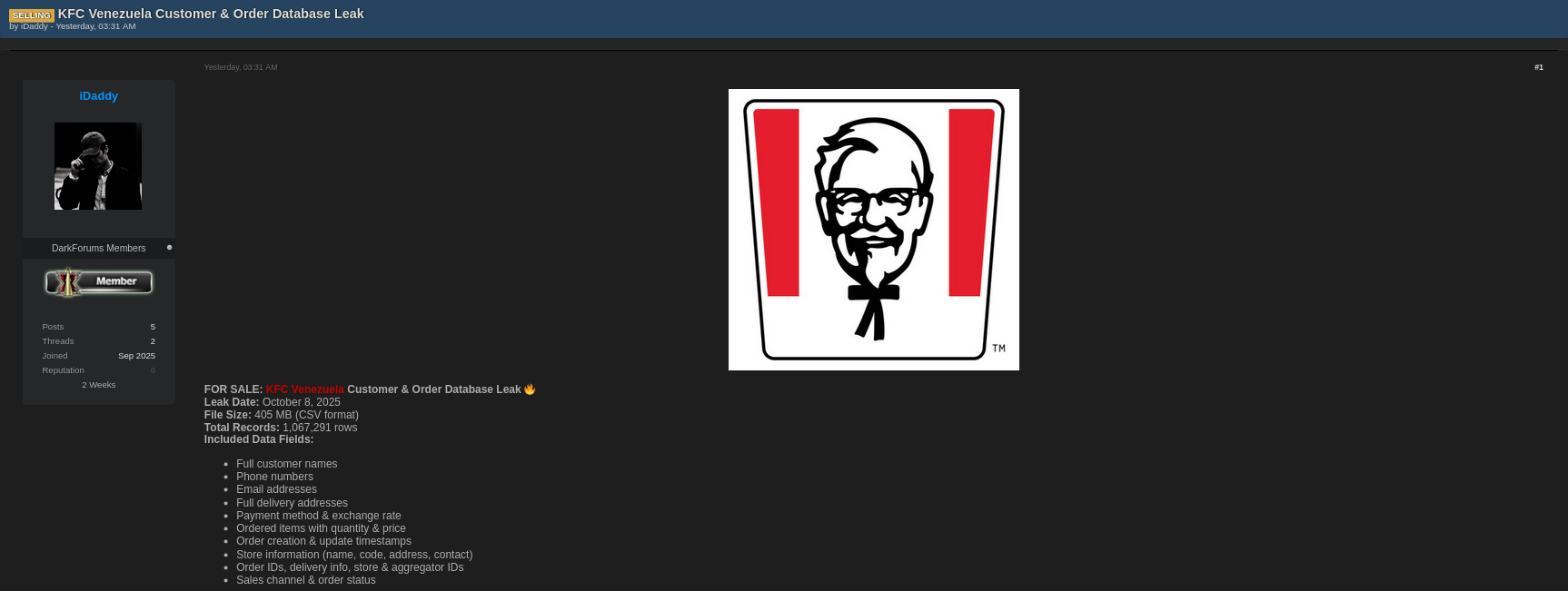KFC Venezuela Suffers Alleged Data Breach Exposing 1 Million Customer Records

➤Summary
In a shocking revelation, KFC Venezuela has reportedly suffered a massive data breach, with more than 1,067,291 customer records allegedly exposed on the dark web. The breach was first spotted on October 8, 2025, by the Kaduu threat intelligence team during one of their regular real-time threat monitoring operations.
The stolen data, allegedly posted by a dark web user going by the alias “iDaddy”, appeared on the underground marketplace Darkforums.st, a known hub for trading stolen databases. According to the listing, the leak includes over one million customer records from KFC Venezuela’s online ordering systems — containing full names, contact details, delivery addresses, and even payment information. 😨
🔎 Discovery by the Kaduu Team
The Kaduu team, known for its ongoing darknet threat detection and threat intelligence platform, stumbled upon the database while scanning for exposed retail and food delivery platforms across Latin America. Using advanced darknet search tool such as darknetsearch.com, the researchers quickly identified the listing on Darkforums.st, where the seller “iDaddy” advertised a fresh data dump from KFC Venezuela.
“We were conducting a regional scan focused on retail and hospitality platforms when we noticed an unusually large listing labeled as ‘KFC Venezuela Database – Over 1M Records’,” explained a Kaduu threat analyst. “The scale and the data types made it immediately clear this was a serious breach.”
📸 [Forum Post Proof]

📂 Details of the Stolen Data
According to the post shared by “iDaddy,” the breached database contained approximately 1,067,291 rows of sensitive information related to KFC Venezuela customers. The database, believed to have originated from the company’s delivery and order management platform, contains highly detailed transactional and personal data.
The fields exposed include:
- Full customer names
- Phone numbers
- Email addresses
- Full delivery addresses
- Payment method and exchange rate used
- Ordered items, including quantity and price
- Order creation and update timestamps
- Store information (store name, code, address, contact number)
- Order IDs, delivery details, store and aggregator IDs
- Sales channel and order status
Such data can be exploited for a range of cybercrimes — from phishing attacks and identity theft to fraudulent food orders and location-based scams. 🍔
📸 [Proof of Data Sample]

🌐 The Role of Dark Web Monitoring
This incident once again highlights the critical role of cyber threat intelligence in modern cybersecurity. The dark web serves as a hidden marketplace where hackers and data traders sell or exchange stolen databases. Organizations like Kaduu continuously scan such spaces to detect early warning signs of breaches before they escalate.
Using darknetsearch.com, investigators were able to confirm the authenticity of the listing and trace related discussions among cybercriminals. This platform specializes in indexing deep and dark web data, allowing security teams to search for leaked credentials, domain mentions, and brand-related threats in real time.
By identifying this leak promptly, the Kaduu team provided valuable intelligence to affected entities and potentially helped limit further exposure.
🧩 Timeline of the Breach
- October 8, 2025: The database is first posted for sale on Darkforums.st by “iDaddy.”
- October 9, 2025: The listing gains traction in several dark web Telegram channels, where threat actors discuss potential buyers.
- October 10, 2025: Kaduu’s deep web investigation operation detects the listing through darknetsearch.com alerts.
This quick timeline demonstrates how fast stolen data can spread across hacker networks once posted. Within just a few days, databases can move through multiple marketplaces and private channels, amplifying the potential risk.
⚠️ Why This Breach Is Alarming
The KFC Venezuela data breach represents a significant privacy risk for customers. While payment card numbers were not explicitly listed, the presence of payment methods, exchange rates, and delivery details offers cybercriminals a strong base for secondary fraud.
Potential risks include:
- Identity theft through name, phone, and email correlation
- Phishing and smishing attacks targeting delivery confirmation messages
- Fake refund scams using real order details
- Location-based extortion exploiting customer addresses
Furthermore, the inclusion of store and aggregator IDs raises the possibility that third-party delivery services or franchise partners could also be indirectly exposed.
🧠 Expert Commentary
Cybersecurity analysts emphasize that retail and fast-food companies have become prime targets due to their reliance on third-party apps and centralized delivery systems.
“Food delivery ecosystems process millions of small transactions daily, often with minimal security oversight compared to financial institutions,” noted Luis Cardenas, an independent cybersecurity consultant. “Attackers know these platforms hold personal and behavioral data that can be easily monetized.”
He further added that brand protection dark web solutions such as darknetsearch.com are now indispensable tools for identifying and mitigating such risks early.
🧰 How Hackers Monetize Leaked Food Delivery Data
Cybercriminals often exploit restaurant delivery data in creative ways. Some of the most common tactics include:
- Targeted scams: Sending fake delivery updates or refund offers.
- Credential stuffing: Reusing customer emails on other platforms to breach additional accounts.
- Data correlation: Matching delivery addresses with social media profiles to build detailed identity maps.
- Account reselling: Selling verified customer accounts for loyalty or coupon exploitation.
- Fraudulent deliveries: Ordering food under compromised accounts to resell locally. 🍟
Such activities illustrate that even non-financial data can have major real-world consequences when aggregated and exploited.
🔐 The Importance of Early Detection
The early identification of this breach underscores the growing necessity for continuous surveillance beyond traditional security controls. Traditional firewalls or antivirus software cannot detect leaks once data leaves corporate infrastructure.
Through platforms like darknetsearch.com, companies gain access to underground threat intelligence, enabling them to respond to breaches before attackers weaponize the information.
This proactive approach involves:
- Monitoring dark web chatter for mentions of brand names or domains
- Tracking leaked email addresses or credentials
- Investigating suspicious data dumps
- Alerting affected users quickly
The Kaduu team’s discovery of the KFC Venezuela data breach exemplifies the value of such proactive defense.
🛠️ How KFC Venezuela Might Respond
Although KFC Venezuela has not yet released an official statement, industry experts suggest several key response steps that organizations in such situations should take:
- Isolate affected systems and revoke compromised API keys.
- Notify customers and advise password resets on delivery accounts.
- Engage forensic investigators to identify the attack vector.
- Collaborate with law enforcement and cybersecurity agencies.
- Implement advanced dark web scan service to track further exposure.
Restoring public trust after such an incident requires transparent communication and proof of improved data protection measures.
🧾 Practical Tip: Protecting Your Data as a Customer
If you’ve ordered from KFC Venezuela online, you should assume your details might be exposed. Follow these best practices immediately:
✅ Change passwords associated with your delivery account.
✅ Be wary of messages claiming to be from KFC or delivery partners.
✅ Do not click links in unsolicited “order refund” emails.
✅ Use credit instead of debit cards for future online purchases.
✅ Monitor your accounts for suspicious transactions.
🔒 Pro Tip: Consider using darknetsearch.com or other breach-check tools to see if your email or phone number appears in known leaks.
🌍 The Bigger Picture in Latin America
This breach reflects a broader cybersecurity challenge across Latin America, where many fast-food chains and e-commerce platforms are digitizing operations without fully strengthening their data protection policies.
With cybercrime growing rapidly, dark web monitoring across the region has become essential to safeguard both consumers and businesses. Many emerging companies are now partnering with cybersecurity firms to detect breaches early through dark web intelligence feeds.
💬 Final Thoughts
The KFC Venezuela data breach serves as yet another reminder that data protection must extend beyond corporate networks and include cyber threat intelligence platform as part of every company’s defense plan.
The discovery by the Kaduu team using darknetsearch.com highlights how early detection and actionable intelligence can make a difference between a contained incident and a full-blown crisis.
🍗 Whether it’s fast food or finance, every business that handles customer data must understand one truth — if it’s valuable, it’s vulnerable.
👉 Discover much more in our complete guide
👉 Request a demo NOW
Your data might already be exposed. Most companies find out too late. Let ’s change that. Trusted by 100+ security teams.
🚀Ask for a demo NOW →Q: What is dark web monitoring?
A: Dark web monitoring is the process of tracking your organization’s data on hidden networks to detect leaked or stolen information such as passwords, credentials, or sensitive files shared by cybercriminals.
Q: How does dark web monitoring work?
A: Dark web monitoring works by scanning hidden sites and forums in real time to detect mentions of your data, credentials, or company information before cybercriminals can exploit them.
Q: Why use dark web monitoring?
A: Because it alerts you early when your data appears on the dark web, helping prevent breaches, fraud, and reputational damage before they escalate.
Q: Who needs dark web monitoring services?
A: MSSP and any organization that handles sensitive data, valuable assets, or customer information from small businesses to large enterprises benefits from dark web monitoring.
Q: What does it mean if your information is on the dark web?
A: It means your personal or company data has been exposed or stolen and could be used for fraud, identity theft, or unauthorized access immediate action is needed to protect yourself.
Q: What types of data breach information can dark web monitoring detect?
A: Dark web monitoring can detect data breach information such as leaked credentials, email addresses, passwords, database dumps, API keys, source code, financial data, and other sensitive information exposed on underground forums, marketplaces, and paste sites.


